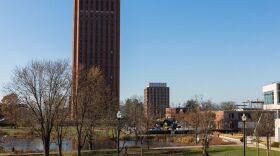A sharp rise in COVID-19 cases at UMass Amherst has left students stuck in place after the university ordered a two-week lockdown.
The lockdown requires students to shelter in their dorms except to get food and attend essential appointments and also bans all student gatherings and outdoor exercise through next Sunday.
For a first-person account of how students are handling this, WBUR’s Morning Edition spoke with Sara McKenna, a UMass senior and secretary of University Policy with UMass Amherst’s Student Government Association.
Here are the interview highlights, lightly edited for clarity.
Interview Highlights
On her personal experience during the lockdown:
“I’ve been holding up well. I have a roommate and we’ve been self-sequestering together, I’m able to drive to go get a meal which is allowed under our guidelines. However, we’ve been trying to stay away from going out in the community except for groceries. We’ve been hearing from a lot of students through surveys that we’ve done that their mental health is struggling right now. They are right now stuck in their dorms for almost the entire day except to go get tested twice a week and to go get food a few times a day.”
On how the lockdown is affecting student life:
“I think it’s been very difficult for students who are living on campus to not be able to walk around. And some students have expressed that that’s really the best part of their day is being outside. We’ve seen one in four students has expressed that their work has been impacted by this shift to high risk. And we’re pretty upset in the Student Government Association that the university is expecting students to go two weeks without earning any income, especially during a time of such financial insecurity when students need to pay for rent, food and other essential items.”
On what the university’s response was:
“We were able to get the administration to agree to pay all student workers who work on campus for all of their scheduled shifts until we are out of this self-sequestering period. Unfortunately, we are still putting all of our power behind advocating for our off-campus workers and asking the administration to say that they will not sanction students for going to work off-campus. They’re only offering an up-to-$300 micro-grant. And we’re fairly certain that they don’t have enough to serve all of the students that need this micro-grant. So we’re really advocating for them to just allow students to go to work.”
On concerns about another shutdown in the future:
“I am concerned that it may be extended if students don’t continue to comply with guidelines. I think students are pretty frustrated when they are following the guidelines and see so many students not following them by attending large gatherings. Even small gatherings in dorms, which we’ve seen a lot of can contribute to the spread quite substantially because it’s so difficult to track those small clusters. And so we’ve been emphasizing to students we really need everyone to comply with the guidelines, follow best practices, wear your mask at all times, and hopefully we’ll be able to get out of this two-week period very soon and start moving down in our risk levels.”
On the possible long-term fallout of the lockdown:
“I hope that a positive comes out of the lockdown in that students will recognize that their actions that may not be following the guidelines do have extreme consequences for both them and the people around them, and hopefully we’ll be able to spend the rest of the semester with all students practicing very safe living under these current circumstances. But I do think that students are going to come out of this and kind of be grateful to be able to do things again. I just hope that it doesn’t escalate.”
This article was originally published on WBUR.org.
Copyright 2021 WBUR







